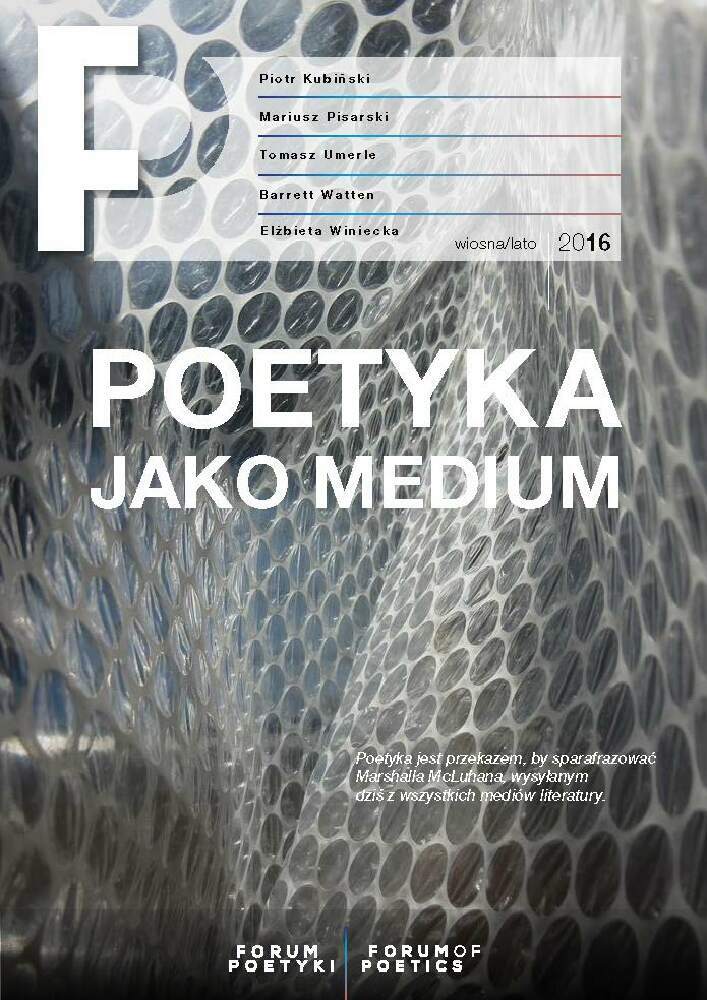Abstract
The purpose of the article is to broaden readers’ understanding of how code is used in digital literary forms. Although digital poetics in the Polish context seems relatively established, the code aspect of works, particularly when we consider works in which a computer program becomes an active, causative subject beyond the full control of author and reader, requires some additional clarification. Using examples from Polish electronic literature, the article recapitulates the typology of code formulated by John Cayley, a pioneer in digital poetry; next, it examines a series of works by Cayley and Howe in which programmed “readers” – supplied with a source text and linguistic resources indexed by Google – are sent on a special mission in search of poetic originality. Three main theses are formulated: programming is a new kind of poetics in action; code in temporal or internet texts attains the status of an autonomous actor, situated in between text, author, and reader, and maintaining contact with other programs on the web; hypertext as a primary paradigm of digital textuality turns out to be a transitional form, from the point of view of the practices of Cayley and Polish cybernetic poets, much closer to the print paradigm, that was originally acknowledged.
References
Aarseth, Espen J. „Nonlinearity and literary theory”. W The new media reader, zredagowane przez Noah Wardrip-Fruin i Nick Montfort. Cambridge, 2002.
Baetens, J. , i F. Truyen. „Hypertext revisited”. Leonardo, nr 5 (2013).
Bell, Alice. The Possible Worlds of Hypertext Fiction. London, 2010.
Cayley, John. „The Code Is Not the Text (Unless It Is the Text) | Electronic Book Review”. Electronic Book Review (blog), 2002. https://electronicbookreview.com/essay/the-code-is-not-the-text-unless-it-is-the-text/.
Cayley, John. „Time code language: new media poetics and programmed signification 307 John Cayley”. W New Media Poetics: Contexts, Technotexts, and Theories, zredagowane przez John Cayley i Thomas Swiss, b.d.
Cayley, John, i Daniel C Howe. How It Is in Common Tongues (The Readers Project: Common Tongues). Providence, 2012.
Cayley, John, i Daniel C Howe. „Readers Project: : Procedural Agents and Literary Vectors”. Leonardo, 2011.
Coveney, Peter, i Roger Highfield. Granice złożoności: poszukiwania porządku w chaotycznym świecie. Warszawa, 1997.
Domańska, Ewa. „«Zwrot performatywny» we współczesnej humanistyce”. Teksty Drugie 2007, nr 5 (2007): 48–61.
„Ebr | Electronic Book Review”. Udostępniono 2 czerwiec 2020. https://electronicbookreview.com/tag/ebr/.
Hayles, Nancy Katherine. „Deeper into the machine: learning to speak digital”. Computers and Composition, nr 19 (2002).
Hayles, Nancy Katherine. „Literatura elektroniczna: czym jest”. Przetłumaczone przez Mariusz Pisarski. Techsty, nr 1(7) (2007). http://www.techsty.art.pl/magazyn/magazyn7/literatura_elektroniczna_czym_jest_1.html.
Hayles, Nancy Katherine. „Print is flat, code is deep: the importance of media-specific analysis”. Poetics Today, 2004, 67–90.
Kirschenbaum, Matthew G. Mechanisms New Media and the Forensic Imagination. Cambridge-Londyn: MIT Press, 2008.
Marino, Mark C. „Critical Code Studies”. Electronic Book Review, 2006. http://www.electronicbookreview.com/thread/electropoetics/codology/.
Meryl, M. „F5: Odświeżanie filologii”. Teksty Drugie, nr 2 (2014).
Monfort, Nick, i Ian Bogost. Racing the Beam. The Atari Video Computer System. Cambridge-Londyn: MIT PRESS, 2009.
Morris, Adalaide Kirby, i Thomas Swiss, red. „Poetics in the Expanded Field: Textual, Visual, Digital…”. W New Media Poetics: Contexts, Technotexts, and Theories. London, 2006.
Pawlicka, Urszula. Polska poezja cybernetyczna: konteksty i charakterystyka. Kraków, 2012.
Pressman, Jessica. Digital Modernism Making It New in New Media. Oxford, 2014.
Raley, R. „Interferences: [Net.Writing] and the practice of codework”. Electronic Book Review, 2002. http://www.electronicbookreview.com/v3/servlet/ebr?command =view_essay&essay_id=rayleyele.
Rettberg, Scott. „Budowanie wspólnoty wokół literatury elektronicznej”. Teksty Drugie, nr 3 (2015): 135–55.
Simanowski, Roberto. Interfictions: vom Schreiben im Netz. Frankfurt, 2002.
„the readers project”. Udostępniono 2 czerwiec 2020. http://thereadersproject.org/.
Wardrip-Fruin, Noah. Expressive Processing Digital Fictions, Computer Games, and Software Studies. Cambridge-Londyn: MIT Press, 2010
License
Authors of articles are responsible for securing the rights to other publications (texts, tables, drawings and other illustrations) quoted or reproduced in their texts.

